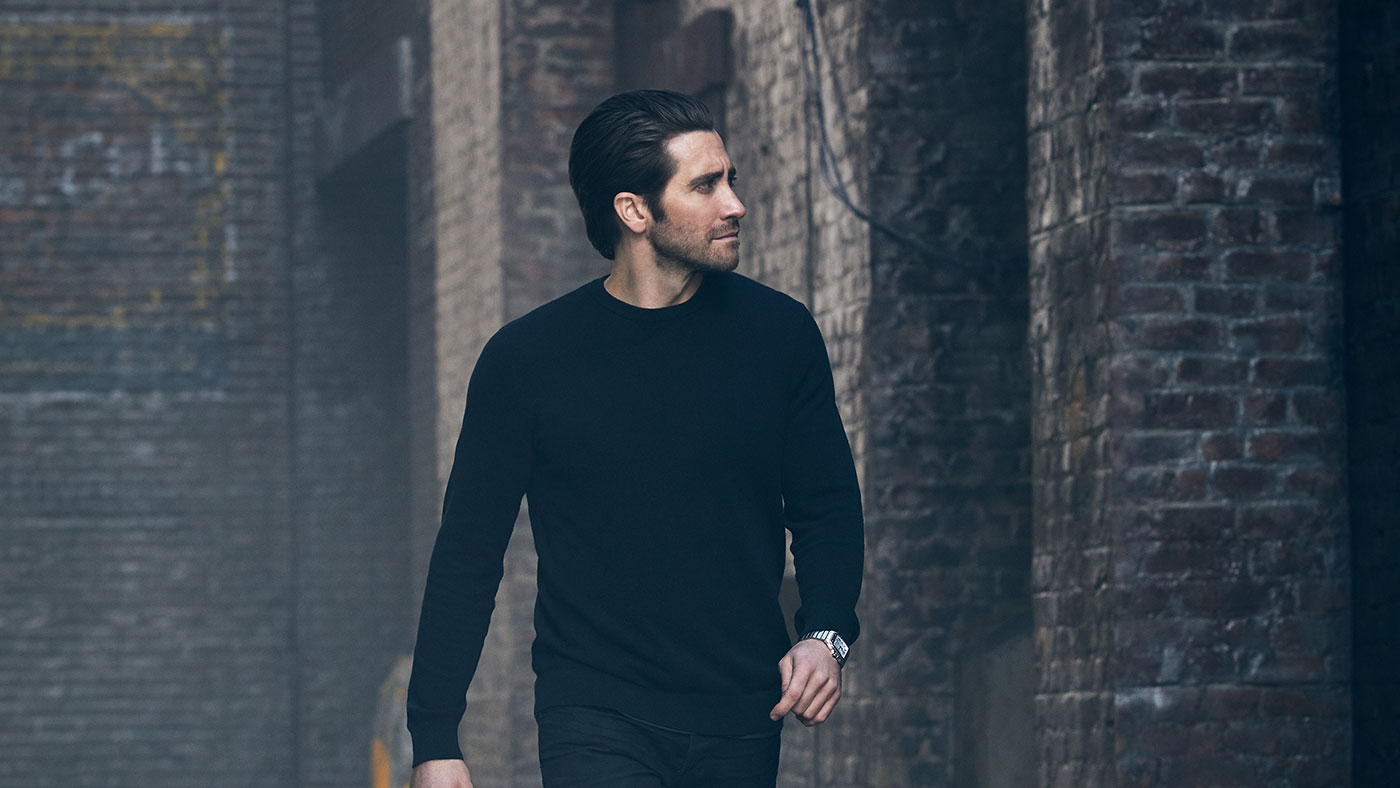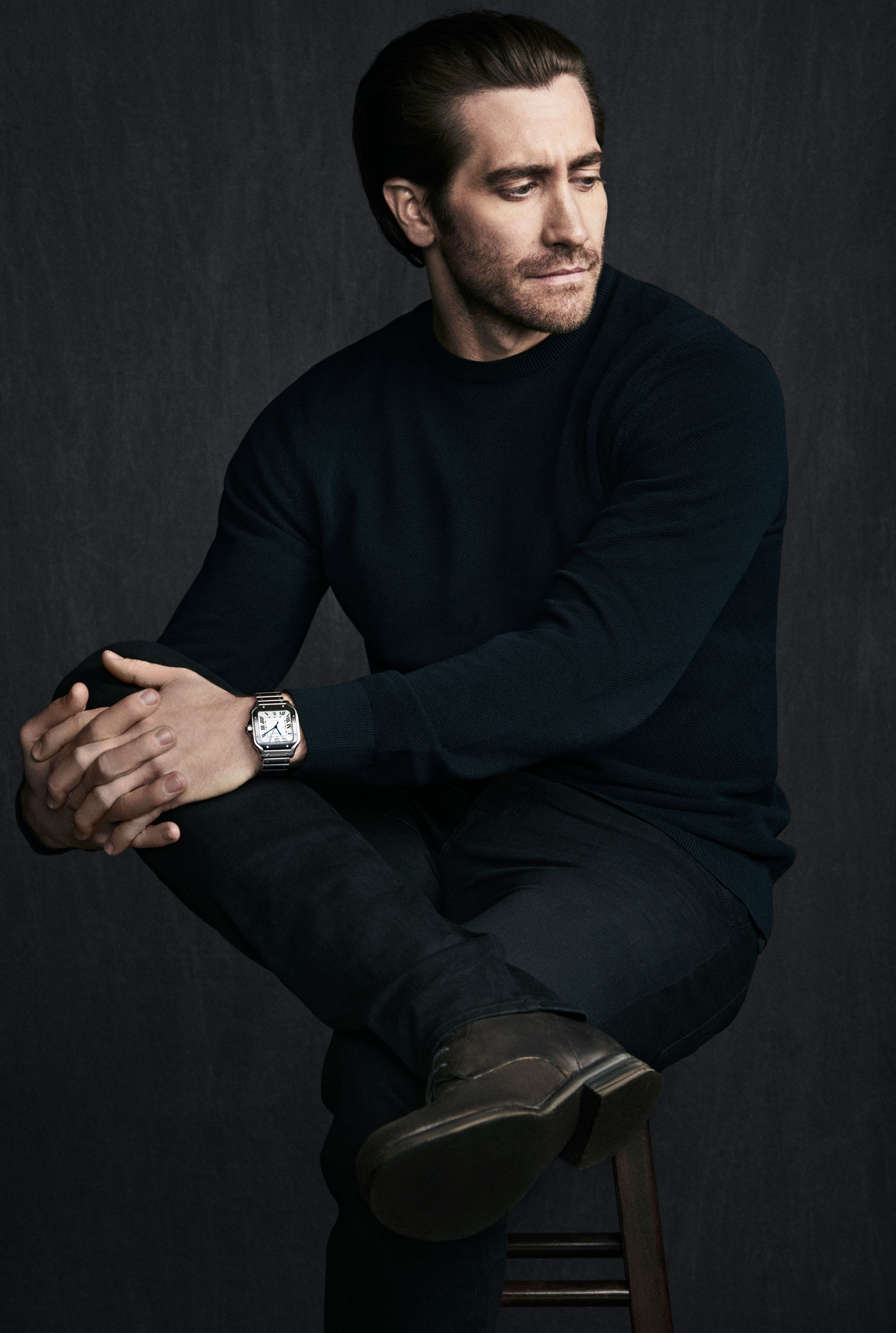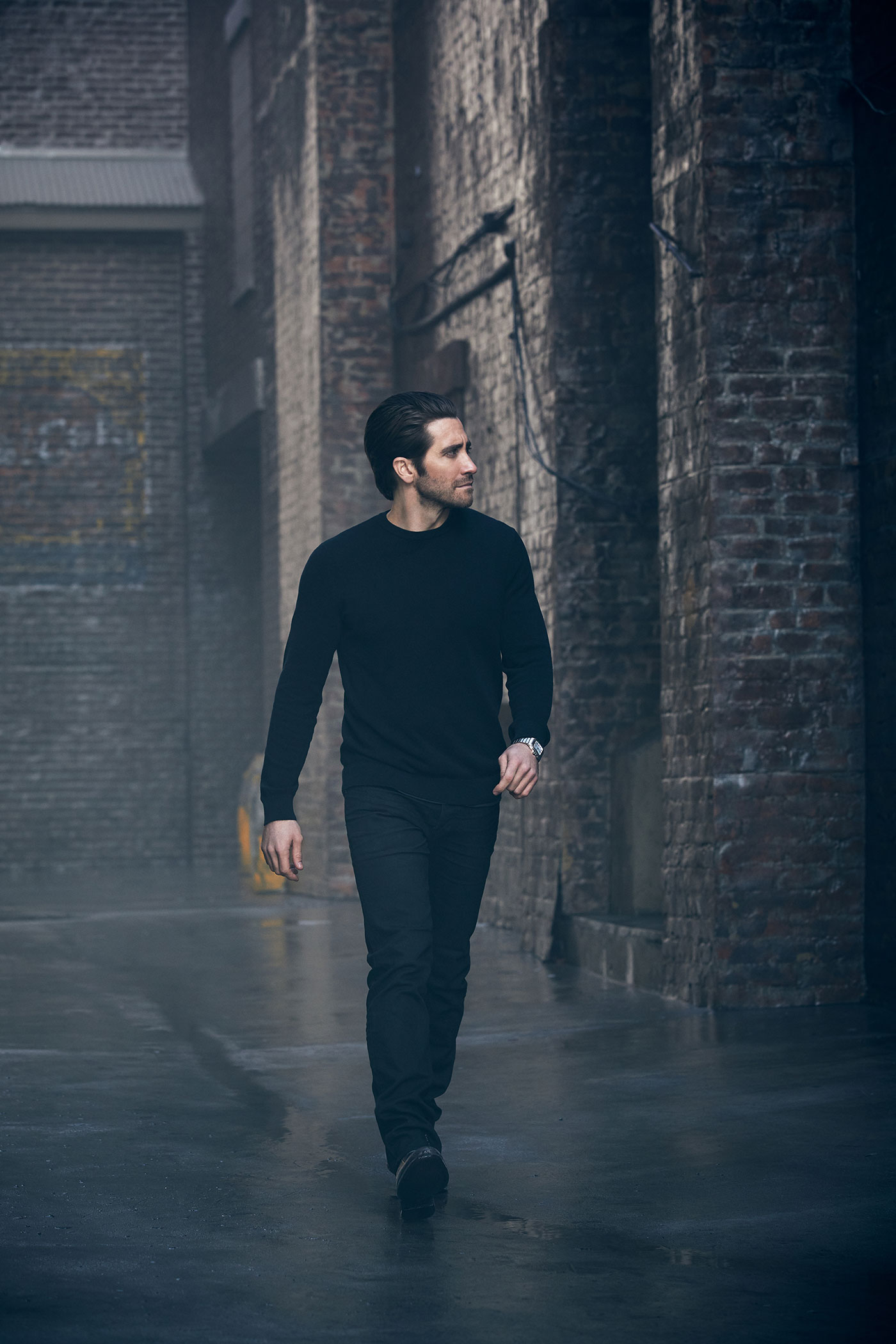Hollywood heavyweight and Cartier ambassador Jake Gyllenhaal on the magic of irreverence

A free daily email with the biggest news stories of the day – and the best features from TheWeek.com
You are now subscribed
Your newsletter sign-up was successful
“I do love reading history books! You’ve done your research!” exclaims Jake Gyllenhaal, smiling broadly in that good-natured, perennially boyish manner of his. The 37-year-old actor has taken off his sunglasses and is looking at me with intense blue eyes. I’ve just asked who he’d most like to play in a biopic, but he’s in no hurry to answer. The habit is rather unnerving, but during the course of the interview it becomes clear that this is just Gyllenhaal in thought. He pauses, a lot, either to consider his answers or to stop himself from veering off topic.
We’re sitting in a trendy but low-key restaurant in Silver Lake, a hip area east of Hollywood that is everything Beverly Hills isn’t: bohemian, arty and unpretentious. It’s the kind of place where no one bats an eyelid when you’re having a tête-à-tête with one of the biggest actors in Hollywood today; or maybe the lack of prying eyes is down to the fact this particular star, dressed in a plain crew-neck T-shirt, blue chinos and lace-up white trainers, looks every bit the Silver Lake local. Gyllenhaal is in a cheerful Sunday mood. “The sunshine is good,” he says kicking back a little before revealing that he’s currently shooting Netflix movie Velvet Buzzsaw, a thriller from his Nightcrawler director Dan Gilroy, set in the art world. It is one of seven movies the New York-based actor has in the pipeline, three of which are scheduled for release later this year.
As for that biopic, he finally settles on Leonard Bernstein. “He is really one of my favourite human beings, artists and characters in the world,” Gyllenhaal explains. “So yeah, we have a project in development.” The actor is seemingly one step ahead: later, I learn that he’s reportedly in talks with Martin Scorsese to produce said biopic on the West Side Story composer and all-round American music hero. And why wouldn’t he be? It’s no secret that Gyllenhaal is an inveterate workaholic, and he makes no bones about his commitment to what he unabashedly calls “the craft of acting”. Some have criticised his seriousness, but no such negativity was cast at Robert De Niro in his prime, to whom Gyllenhaal is often compared, and who was famously career-driven in his thirties and forties (and similarly guarded about his private life). Let’s not forget that Gyllenhaal is also a producer, having established his company, Nine Stories, in 2015 with acclaimed indie exec Riva Marker. Together, they are making movies – as well as TV shows and theatre productions – that go against the Hollywood grain; smaller to mid-size passion projects that are purely talent-driven.
The Week
Escape your echo chamber. Get the facts behind the news, plus analysis from multiple perspectives.

Sign up for The Week's Free Newsletters
From our morning news briefing to a weekly Good News Newsletter, get the best of The Week delivered directly to your inbox.
From our morning news briefing to a weekly Good News Newsletter, get the best of The Week delivered directly to your inbox.

For our interview, there are some obvious no-go topics – most notably, his love life and anything that might compromise his privacy – but do people genuinely want to know what the actor likes for brunch? Or, indeed, how his heart has fared through various relationships over the years? No doubt he remembers those short-but-sweet romances the way we all do: nice while they lasted, but not much beyond that. Gyllenhaal quite rightly prefers to stick to subjects that fire him up and fuel that thinking mind of his. As such, his appointment as Cartier’s first official watch ambassador – historically, the French house has only had ‘friends of the house’ – is not just a simple case of him smiling in campaigns and looking handsome, although he does do this very well. He is genuinely suited to the Santos watch he wears, not least because the timepiece is steeped in history. On this subject, it’s the actor who has done his research: “What’s interesting,” Gyllenhaal says, “is learning about the history of this piece, the legacy of this watch and how it first came to be, which is really about collaboration. That of two minds that were equally as interested in artistry as they were science.”
He’s spot on about the symbiosis. The Cartier Santos was created by Louis Cartier in 1904 for his friend, the Brazilian aviator Alberto Santos-Dumont, who complained of his difficulty checking the time on his pocket watch while flying. As such, the Santos was the world’s first pilot’s watch, and one that directly reflected changes in the infrastructure of Paris at the turn of the 20th century, drawing from the clean lines and simple geometry of Haussmann’s grid and the Eiffel Tower.
Santos-Dumont was a true pioneer and daredevil in the field of early aviation. Engrossed in the novels of Jules Verne as a child, he took his first balloon flight in Paris at the age of 15 and invested his finances – inherited from his father, a wealthy coffee planter – into the construction of airships. Later, he moved on to heavier-than-air craft including monoplanes, biplanes, and even an early helicopter, which despite his best efforts, he was unable to get off the ground. His most famous invention was the tiny but speedy Demoiselle monoplane (or ‘Damselfly’) first built in 1907 and made of wood, bamboo and steel, with wings cast from silk. His death-defying feats and wacky eccentricities endeared him to Paris’ Belle Époque society. He insisted on wearing a Panama hat everywhere he went – even to bed – and he held dinner parties on long-legged tables and chairs so that guests could get a sense of what it was like to be up in the air. But Santos-Dumont was plagued by mental health problems and he spent long periods in sanatoriums in France and Switzerland. In 1932, he committed suicide in São Paulo. His was, nonetheless, a life lived large; a true hero of the skies.
Bernstein is a good call for Gyllenhaal: you can easily imagine the actor morphing into the prodigal musician in his prime – a man famed for his boundless energy, intellectual precision and dashing good looks. But the bon-vivant Brazilian aviator would also be an ideal subject for Gyllenhaal to get his teeth into, given the actor’s predilection for playing complex personalities and tortured souls, at once flawed and compelling. “[The watch] is a reminder of authenticity and staying true to your own idiosyncrasies and oddities, as well as, you know...” he says tailing off. He doesn’t finish the sentence, possibly because he’s mentioned the most important details; Gyllenhaal has in the past talked at length about how it is exactly these ‘oddities’ or nuances that authenticate a character in the eyes of a moviegoer.
A free daily email with the biggest news stories of the day – and the best features from TheWeek.com
Gyllenhaal delves deep when it comes to preparing for a role; he likes to get under the skin of a character. As light heavyweight Billy Hope in boxing drama Southpaw (2015), he famously bulked up and fought his own matches in the ring without the help of a stunt double. He maintains he would have followed the same gruelling fitness regime – 2,000 sit-ups a day, as well as ridiculously long hours in the gym – even if there had been no fights in the script. For neo-noir thriller Nightcrawler (2014), he made sure he looked as creepy as possible in the role of psychopathic news cameraman Lou Bloom, shedding 30lb and depriving himself of sleep. For Stronger (2017), in which he plays real-life double amputee Jeff Bauman, whose injuries were sustained in the 2013 Boston Marathon bombing, Gyllenhaal admits the stakes were higher. His way of getting physically ready for the part was to spend as much time with Bauman as possible, eventually striking up a friendship with the now 32-year-old. In fact, the actor describes the making of the film as an emotionally charged experience that created an unbreakable bond between the two men. “Yes, it was a huge responsibility, but for two reasons,” he says when asked if he ever felt daunted by the brutal honesty of the story, based on Bauman’s own warts-and-all memoir. “It’s not just Jeff, it’s also the city and the people [of Boston] who experienced this horrific event. Then, also, I think it’s knowing in my own heart that I don’t think I would have been able to have survived what he did.” Surely he can’t say that for certain? It’s a question that’s met with much deliberation. “I guess I don’t know, but I would say that I don’t have certain qualities he had – and still has – that got him through that situation,” he explains, followed by a good 10 seconds of silence. “I mean, that was a constant question for me the entire time. I still think, ‘Did I do OK? Did I do enough?’ That’s always on my mind with Jeff in particular.”

Perhaps unwinding from a character is just as difficult as building up to one. “I think [some experiences] stay with you always,” he concedes, “but also there is a real craft to acting. You know, it’s called a craft for a specific reason. I keep boundaries between my life and my work so that I can move in and out. Sure, there is the occasional seepage – you know, when I have moved or I’ve done something [like a certain character]. Yeah, that kind of freaks me out.”
Since his breakthrough leading role in Donnie Darko (2001) – a surrealist gem about a high-school student haunted by visions of a monstrous 6ft-tall rabbit – Gyllenhaal has starred in more than 30 feature-length films, including landmark movie Brokeback Mountain (2005), for which he was nominated for an Oscar. There have consistently been moments of art- house brilliance – watchable blockbusters, too, of course – but it’s the more daring, less commercially successful films that have cemented his reputation as a dynamic and chameleonic talent; movies such as Tom Ford’s hard- hitting Nocturnal Animals (2016), Sam Mendes’ US Marines drama Jarhead (2005) and Dan Gilroy’s aforementioned Nightcrawler (2014), widely praised as a cinematic tour de force thanks to Gyllenhaal’s gripping and razor-sharp performance as the morally vacant anti-hero. Enemy, a lesser-known 2013 feature directed by Canadian filmmaker Denis Villeneuve – he of Blade Runner 2049 fame – has a cult following, particularly among fans of surrealist, David Lynch-inspired cinema.
In February, Gyllenhaal impressed critics with his Broadway musical debut in a revival of the Stephen Sondheim classic Sunday in The Park With George, putting in a solid vocal performance in what is a poignant, rather than breezy, musical production. So far, however, he has only flirted with comedy, preferring characters caught in a whirlwind of emotions. Surprisingly, he has also only starred in one remake: Brothers (2009), based on a 2004 Danish movie about sibling rivalry set against the backdrop of the Afghanistan war. Was this a one-off? “There’s a movie I want to remake, but I can’t tell you – it will ruin my chances!” he laughs. “It’s hard as humans to let something be. I have a good friend who says something really great: ‘There’s nothing better than perfect.’ It’s like when you have a couple of drinks, there’s a nice buzz and you’re like, “Oh, just one more,’ and then you’re like, [holds his head] ‘Why did I do that?’ In every context, there’s a movie in that space. Let it be and go watch it again.”
With Gyllenhaal, serious talk is always tempered with a touch of the colloquial: his way of skilfully lightening the tone of the conversation without diminishing the more heartfelt aspects of what he’s trying to say. You get a proper sense of this when he explains his movie choices: “I look back at the stories that have moved me, shaken me up and demanded that I look at the world a certain way. Most of the time, comparatively, they are not the ‘pop ones’; they are outside of that. I was always moved by strong characters as a kid. Some didn’t always make me walk out of the theatre feeling good, but they did make me feel hope because I could relate to their faults, perversities and struggles,” he explains, before expanding on his music metaphor. “It’s like Bruce Springsteen said in his documentary [about the making of his 1978 album Darkness On The Edge Of Town]. He said that more than money and fame, he wanted to be great. As an artist, this is a question for me: ‘Are you expressing who you are as best you can?’”Out of context – ie, not sat in the Californian sunshine, listening to Gyllenhaal’s slow and considered answers – it’s hard to convey just how earnest the actor sounds. There’s nothing pretentious, arrogant or even self-indulgent about his tone. He’s serious about his motivations as an actor – as serious as Louis Cartier was about design that reflected the zeitgeist; as serious as Alberto Santos-Dumont was about his marvellous flying machines. Luckily, just like the latter, the actor has mastered the art of levity. “I’m mean, I’m not sitting here saying that all I like is some obscure s***,” he laughs. “I love all sorts of movies. Try remaking The Goonies. I mean, it’s impossible. It’s a masterpiece!”
-
 Why is Prince William in Saudi Arabia?
Why is Prince William in Saudi Arabia?Today’s Big Question Government requested royal visit to boost trade and ties with Middle East powerhouse, but critics balk at kingdom’s human rights record
-
 Wuthering Heights: ‘wildly fun’ reinvention of the classic novel lacks depth
Wuthering Heights: ‘wildly fun’ reinvention of the classic novel lacks depthTalking Point Emerald Fennell splits the critics with her sizzling spin on Emily Brontë’s gothic tale
-
 Why the Bangladesh election is one to watch
Why the Bangladesh election is one to watchThe Explainer Opposition party has claimed the void left by Sheikh Hasina’s Awami League but Islamist party could yet have a say